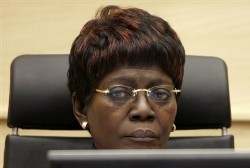ICC judges ask prosecutor for additional material on Bashir’s arrest warrant
October 15, 2008 (WASHINGTON) – The Judges of the International Criminal Court (ICC) have asked the prosecutor today for additional information on his application requesting the issuance of an arrest warrant for Sudanese president Omer Hassan Al-Bashir.

The judges of the Pre-Trial Chamber I consist of Akua Kuenyehia from Ghana, Sylvia Steiner from Brazil and Anita Usacka from Latvia.
The judges attached a confidential annex to their request which contained items for which the prosecutor is required to furnish extra documentation.
The ICC prosecutor has until November 17 to provide the information.
In mid-July the ICC’s prosecutor Luis Moreno- Ocampo filed 10 charges: three counts of genocide, five of crimes against humanity and two of murder and accused Al-Bashir of masterminding a campaign to get rid of the African tribes in Darfur; Fur, Masalit and Zaghawa.
Today marks three months since Ocampo announced his intention to seek an arrest warrant for Al-Bashir. It was widely expected that the judges will issue a decision in mid-October.
Last month the US Ambassador to the United Nations Zalmay Khalilzad was quoted as saying that he expects the ICC judges to make a ruling on the prosecutor’s request by October 15th.
However Ocampo downplayed these speculations saying that a decision will likely not be made until the judges ask to meet with him.
On October 1st the ICC judges met with Ocampo for over 3 hours in a closed session for oral discussions on his case against Sudanese president. The transcript of the hearing has not been released.
Ocampo was present at the hearing along with Essa Faal from Gambia working as the senior Trial lawyer on the Bashir case.
ICC Judges routinely meet with the prosecutor following a request submitted by him for an arrest warrant or summons to appear to question aspects of the case before making a decision.
Last year the Pre-Trial Chamber I convened a similar meeting with the prosecutor to discuss the application regarding Ahmed Haroun, state minister for humanitarian affairs, and militia commander Ali Kushayb charged in connection with Darfur war crimes.
The meeting is believed to have discussed whether or not the two suspects will surrender themselves voluntarily to the court justifying a summons to appear rather than an arrest warrant.
It is hard to assess the significance of today’s decision which is normally not made public. No official from the ICC could be reached for comment.
It could be said that the judges feel that further evidence is needed for them to come up with a decision. On the other hand the it may simply be a request to summarize the evidence to address specific parts of the case that will form the basis of their decision.
The prosecutor’s application well exceeded the 50 page limit mandated by the ICC rules. The rule can be suspended if prosecutor request it from the judges and is granted.
Many observers are waiting to see whether the judges will endorse genocide counts brought against the Sudanese president which are likely to have political consequences particularly for Khartoum’s allies in the Arab world and Africa.
European Union (EU) rules prohibit its officials from communicating with individuals indicted of war crimes.
The ICC prosecutor has maintained a 100% success rate in all the requests for arrest warrants he previously made to the judges in the other cases handled by the court.
To issue an arrest warrant on the charges filed by the prosecutor the ICC judges have to be convinced that there are ‘reasonable grounds’ that the individual(s) committed the crimes listed in the filing.
Once the individual(s) are in custody a confirmation of charges hearing is held before a trial is commenced. The judges could confirm or decline the charges for which an arrest warrant was issued.
If the judges affirm Ocampo’s application Al-Bashir will be the first sitting head of state indicted while in office of war crimes.
Depending on when the prosecutor’s office submits the material a decision may be forthcoming before December 12 which is the date the court goes into recess until January 2009.
Given the high profile nature of the case it is likely that the judges would want to make a ruling before the recess. Khartoum and a number of world countries are scrambling to secure a suspension of the court’s work on the Bashir’s case through a UN Security Council (UNSC) resolution to invoke Article 16.
However chances for a deferral appears dim due to resistance from Western countries on the UNSC.
Sudan has not ratified the Rome Statute, but the UNSC triggered the provisions under the Statute that enables it to refer situations in non-State parties to the world court if it deems that it is a threat to international peace and security.
(ST)
